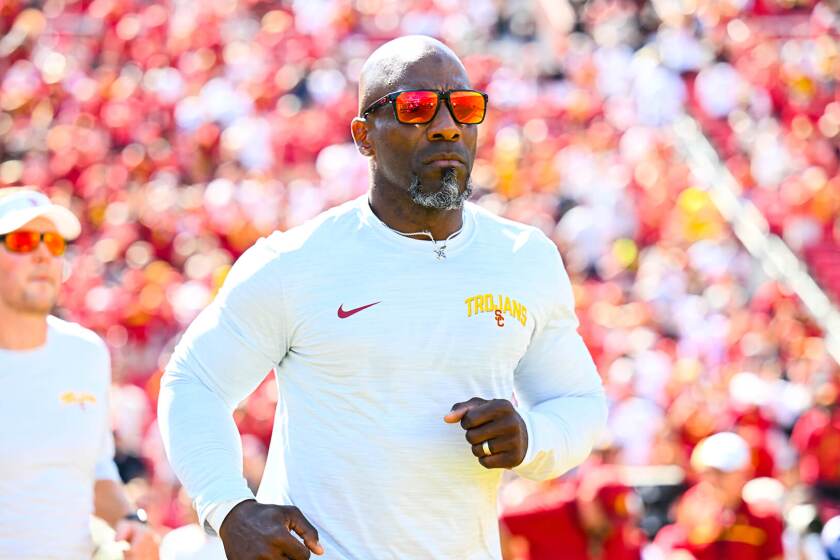Coaches Take Scouts’ Advice With Caution
- Share via
College football coaches often use lists of prospective players compiled by scouting services the same way a food critic ponders an unfamiliar menu at a new restaurant.
Many of the possibilities look extremely tempting on paper, but it’s up to the coach or critic to discover whether they actually live up to their description.
For college coaches, the scouting services provide something akin to a human treasure map. But coaches at USC and UCLA say they certainly don’t always strike gold.
And sometimes, an alert alumnus or assistant coach stumbles across a nugget that didn’t appear prominently on anybody’s map. For example, Duane Bickett, a former USC All-American linebacker who graduated in 1984 and now plays for the Indianapolis Colts, did not appear on the scouting service lists, according to Trojan defensive coordinator Artie Gigantino.
“A lot of the time, the rating services are really right on the money,” said UCLA Coach Terry Donahue. “But sometimes they will put a guy down the list where it looks like a school like UCLA wouldn’t want him, and we end up recruiting him and we’re really happy with him. Other times, they put someone out as a blue, blue, blue chipper and we don’t agree.”
So, when the coaches go prospecting, they generally arm themselves with a touch of healthy skepticism.
Gigantino praises the job the services do in identifying prospects. But the key word is prospects . Gigantino draws the line at accepting the ratings as necessarily accurate.
“Who came down and said these people are the experts?” Gigantino asks. “How can they be experts when they don’t evaluate players? They can’t evaluate a thousand players (each season).”
The role of these services, he says, is to point out the possibilities, not to evaluate whether the players’ abilities are necessarily suitable for college.
“What these people do is provide us an outstanding checklist of names,” he said. “You can never have too many lists. . . . (But) when you talk about recruiting, we’re the ones who have got to live with the players, so we’d better make the decisions.”
USC Coach Ted Tollner said: “I would not allow our staff to offer a scholarship based on that (rating) alone. I want to know something about what makes the young man tick, academically and personally. The service alerts us to them and we check them all out.”
Donahue agreed. “I think they are useful up to a point,” he said. “I think they serve us quite well in the area of research, in finding people, but I don’t think they serve very well in the area of evaluation.
“In other words, we’d never make a determination about a player based on a ranking by the rating services. We might have our interest stirred by the services, but we investigate and make an independent evaluation.
“Part of being a good recruiter is . . . having the ability to make a projection about the player’s development. It’s a very difficult thing to do and we wouldn’t leave it up to a rating service. We’d want to do it ourselves.”
But Donahue said that when the Bruin staff’s opinion of a player’s talents differs dramatically from that of the services, it often creates enough doubt among coaches to give the player a harder look.
“When we turn down a rating service’s blue, blue chipper, we say, ‘Why do we feel he’s not that high and they do? Is there something we’re missing here?’ ” Donahue said.
Tollner emphasized that coaches are far from infallible. “It goes both ways,” he said. “We see people we rank high and sometimes we’re wrong, too.”
But a college coaching staff which fails to do its homework by blindly swallowing the services’ ratings could run the risk of getting burned. Gigantino cited an extreme example, which has become a sort of cautionary tale in the recruiting field.
Several years ago a high school coach in a southern town supposedly created a fictitious top prospect, equipped with dazzling speed, size and statistics. This imaginary star, Gigantino says, subsequently turned up on one scouting service’s All-America team.
So the coaches, like any consumers, can’t be blamed for their attitude of “let the buyer beware.”
Given those parameters, however, USC and UCLA coaches said they find the services a vital part of the initial phases of recruiting.
“We don’t believe them or disbelieve them. It’s all how you want to use the information,” said Dick Laguens, recruiting coordinator at USC.
“Recruiting is not an exact science. Everyone has his own opinion. The end result is, how does a player develop three or four years down the line? And nobody can really tell that.”
More to Read
Go beyond the scoreboard
Get the latest on L.A.'s teams in the daily Sports Report newsletter.
You may occasionally receive promotional content from the Los Angeles Times.






